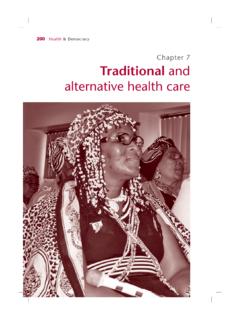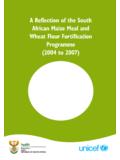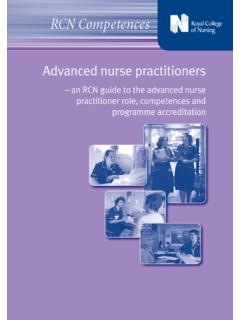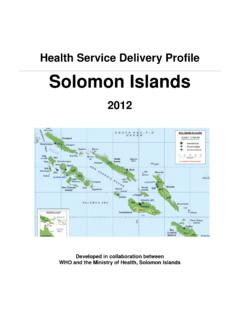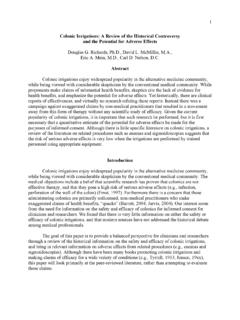Transcription of Case CCT 12/05 DOCTORS FOR LIFE …
1 CONSTITUTIONAL COURT OF SOUTH AFRICA case CCT 12/05 DOCTORS FOR LIFE INTERNATIONAL Applicant versus THE SPEAKER OF THE NATIONAL ASSEMBLY First Respondent THE CHAIRPERSON OF THE NATIONAL COUNCIL OF PROVINCES Second Respondent THE MINISTER OF HEALTH Third Respondent THE SPEAKER OF EASTERN CAPE PROVINCIAL LEGISLATURE Fourth Respondent THE SPEAKER OF FREE STATE PROVINCIAL LEGISLATURE Fifth Respondent THE SPEAKER OF GAUTENG PROVINCIAL LEGISLATURE Sixth Respondent THE SPEAKER OF KWAZULU-NATAL PROVINCIAL LEGISLATURE Seventh Respondent THE SPEAKER OF LIMPOPO PROVINCIAL LEGISLATURE Eighth Respondent
2 THE SPEAKER OF MPUMALANGA PROVINCIAL LEGISLATURE Ninth Respondent THE SPEAKER OF NORTHERN CAPE PROVINCIAL LEGISLATURE Tenth Respondent THE SPEAKER OF NORTH WEST PROVINCIAL LEGISLATURE Eleventh Respondent THE SPEAKER OF WESTERN CAPE PROVINCIAL LEGISLATURE Twelfth Respondent Heard on : 23 August 2005 and 21 February 2006 NGCOBO J Decided on : 17 August 2006 JUDGMENT NGCOBO J: I.
3 Introduction [1] [2] This case concerns an important question relating to the role of the public in the law-making process. This issue lies at the heart of our constitutional democracy. The Court is required to answer three related questions. The first question concerns the nature and the scope of the constitutional obligation of a legislative organ of the state to facilitate public involvement in its legislative processes and those of its committees and the consequences of the failure to comply with that obligation. The second question concerns the extent to which this Court may interfere in the processes of a legislative body in order to enforce the obligation to facilitate public involvement in law-making processes. In particular, whether it is competent for this Court to interfere during the legislative process before a parliamentary or provincial bill is signed into law.
4 The third question concerns the issue whether this Court is the only court that may consider the questions raised in this case . These issues arise out of a constitutional complaint brought directly to this Court by DOCTORS for Life International, the applicant. Its complaint is that the National Council of Provinces ( NCOP ), in passing certain health bills, failed to 2 NGCOBO J invite written submissions and conduct public hearings on these Bills as required by its duty to facilitate public involvement in its legislative processes and those of its committees. [3] [4] Following a brief review of the facts, I will identify the issues for determination in this case . II. Factual background Parliament has enacted four health statutes, namely, the Choice on Termination of Pregnancy Amendment Act 38 of 2004 ( the CTOP Amendment Act ); the Sterilisation Amendment Act 3 of 2005; the Traditional Health Practitioners Act 35 of 2004 ( the THP Act ); and the Dental Technicians Amendment Act 24 of 2004.
5 The constitutional challenge relates to these statutes, which I shall collectively call the health legislation. The applicant s complaint is that during the legislative process leading to the enactment of these statutes, the NCOP and the provincial legislatures did not comply with their constitutional obligations to facilitate public involvement in their legislative processes as required by the provisions of sections 72(1)(a) and 118(1)(a) of the Constitution, respectively. In terms of section 72(1)(a), the NCOP must .. facilitate public involvement in [its] legislative and other processes .. and [those of] its committees. Section 118(1)(a) contains a similar provision relating to a provincial legislature. 3 NGCOBO J [5] [6] [7] The applicant accepts that the National Assembly has fulfilled its constitutional obligation to facilitate public involvement in connection with the health legislation.
6 This, the applicant says, was done by the National Assembly by inviting members of the public to make written submissions to the National Portfolio Committee on Health and also by holding public hearings on the legislation. That process, the applicant maintains, complied with section 59(1)(a) of the The applicant alleges that the NCOP and the various provincial legislatures were likewise required to invite written submissions and hold public hearings on the health legislation. This is what the duty to facilitate public involvement required of them, the applicant maintains. The constitutional challenge was initially directed at the Speaker of the National Assembly and the Chairperson of the NCOP only. The Speakers of the nine provincial legislatures and the Minister of Health were subsequently joined as further respondents because of their interest in the issues raised in these I shall refer to all respondents collectively as the respondents, unless the context requires otherwise.
7 The respondents deny the charge by the applicant. They maintain that both the NCOP and the various provincial legislatures complied with the duty to facilitate 1 Section 59(1)(a) is the equivalent of section 72(1)(a) and it applies to the National Assembly. It provides: (1) The National Assembly must (a) facilitate public involvement in the legislative and other processes of the Assembly and its committees . 2 On 2 June 2005, following an application by the Minister of Health, this Court made an order joining the Minister of Health as the third respondent. Following the hearing on 23 August 2005, the Court made an order on 23 September 2005 joining the Speakers of the nine provincial legislatures as the fourth to twelfth respondents in the matter. The Chief Justice also issued directions for the further conduct of this case . 4 NGCOBO J public involvement in their legislative processes.
8 They also take issue with the scope of the duty to facilitate public involvement as asserted by the applicant. While conceding that the duty to facilitate public involvement requires public participation in the law-making process, they contend that what is required is the opportunity to make either written or oral submissions at some point in the national legislative process. [8] [9] [10] The applicant has approached this Court directly. It alleges that this Court is the only court that has jurisdiction over the present dispute because it is one which concerns the question whether Parliament has fulfilled its constitutional obligations. The jurisdiction of this Court to consider such disputes is conferred by section 167(4)(e) of the Constitution. That section provides that [o]nly the Constitutional Court may .. decide that Parliament .. has failed to fulfil a constitutional obligation.
9 The respondents did not contest any of this. There is therefore no dispute between the parties as to whether this Court has exclusive jurisdiction in this matter under section 167(4)(e). But the question whether this Court has exclusive jurisdiction in this matter is too important to be resolved by concession. When the applicant launched the present proceedings it was under the mistaken belief that all the health legislation was still in bill form. But, as it turned out, all of the legislation except the Sterilisation Amendment Act had been promulgated when 5 NGCOBO J these proceedings were launched on 25 February This fact was readily ascertainable all along. The challenge relating to the Sterilisation Amendment Act would have required this Court to intervene during the legislative process. This raised the question of the competence of this Court to intervene in the legislative process.
10 Given the importance of this question, the Chief Justice placed it squarely on our agenda by issuing The parties were thus invited to submit written argument on the question, and it was fully debated. 3 The Dental Technicians Amendment Act 24 of 2004 was promulgated on 1 December 2004. Government Gazette 27034 GN 1395, 1 December 2004. It has not yet come into operation. The Choice on Termination of Pregnancy Amendment Act 38 of 2004 was promulgated and came into operation on 11 February 2005. Government Gazette 27267 GN 129, 11 February 2005. The Traditional Health Practitioners Act 35 of 2004 was promulgated on 11 February 2005. Government Gazette 27275 GN 132, 11 February 2005. Some but not all sections of the Act came into operation on 13 January 2006. Government Gazette 28389 GN 19, 11 January 2006. The Sterilisation Amendment Act 3 of 2005 was promulgated and came into operation on 22 June 2005.










![Traditional Helath Practitioners Act [No. 35 of 2004]](/cache/preview/c/7/d/4/5/8/f/6/thumb-c7d458f692bae21cab4d196ac02eea51.jpg)
